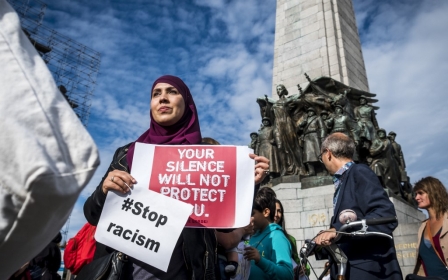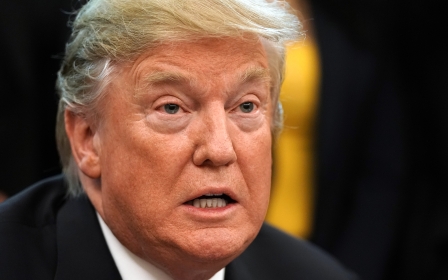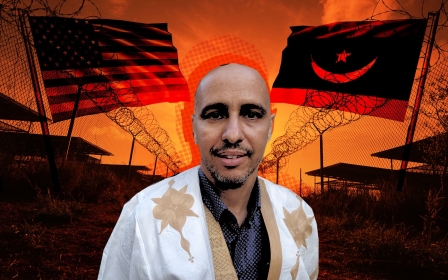Guantanamo: An enduring symbol of US Islamophobia

Nothing hits you harder than realising you’ve been singled out for differential treatment.
This is how I felt as a Muslim American when I learned about the opening of the Guantanamo Bay prison camp. It was 2002, and what would become the post-9/11 "war on terror" was still evolving.
Though Muslims have long been targeted in the US, as a young Muslim, learning about Guantanamo Bay introduced me to the specifics of how this country would criminalise my community. To many Muslim Americans, this prison - an extrajudicial space deliberately opened off the US mainland - is a haunting symbol of Islamophobia.
Alternate legal structure
The first 20 detainees arrived at Guantanamo Bay on 11 January 2002, exactly four months after 9/11. The base, on land in Cuba long occupied by the US, was repurposed as a prison for Muslim men - but to obscure this fact, it was presented as a detention facility for Taliban and al-Qaeda terrorism suspects. That they were all Muslim was treated as a coincidence.
Stay informed with MEE's newsletters
Sign up to get the latest alerts, insights and analysis, starting with Turkey Unpacked
From its inception, Guantanamo was about creating a separate system of justice that would make it easier for the US to utilise tactics such as torture, based on the premise that US laws did not apply to prisons outside of the US mainland.
With these narratives stacked against them, the Muslim men detained were denied the presumption of innocence until proven guilty
Constructing terrorism as an inherently Muslim crime, exceptional in its scope and brutality, is what allowed it to exist in this alternate legal structure. This idea, captured in the oft-cited narrative that the prisoners sent to Guantanamo were “the worst of the worst”, has specifically justified the need for an offshore prison.
Furthermore, the US government claimed that the men detained at Guantanamo were all “suspected terrorists”. With these narratives stacked against them, the Muslim men detained were denied the presumption of innocence until proven guilty.
Denial of justice
Getting people to acknowledging the fact that every prisoner at Guantanamo is Muslim has been part of the problem. Many will ignore the centrality of Muslim identity when it comes to Guantanamo, but it is worth noting that much of the abuse and torture these men suffered was deeply rooted in Islamophobia. Examples include being force-fed during Ramadan, having their hair and beards shaved off, and having their Qurans desecrated in front of them.
But Guantanamo Bay is not just about deeply entrenched Islamophobia, which rationalises the denial of justice to the Muslim prisoners it houses. It’s also about setting a precedent on how any Muslim should expect to be treated when it comes to justice in the context of national security.
It’s also about justifying a parallel legal structure for a certain subset of people. We need look no further than US President Donald Trump, who has threatened to send new prisoners to Guantanamo, including the perpetrator of a truck attack in New York in 2017.
Despite this, the many calls to close Guantanamo have instead been based on the cost of the prison, the contradiction it poses to US values, and the idea that it serves as a terrorist recruitment tool. All of these reasons were captured in former President Barack Obama’s remarks in 2016, and they continue to be echoed by the country’s political establishment.
Recognising Muslim humanity
Last month, during the last Democratic debate of 2019, candidates Elizabeth Warren and Joe Biden both responded to a question on closing Guantanamo Bay by saying that they would shut down the prison. In their explanations, Warren cited its inconsistency with American values, while Biden called it an “advertisement for creating terror”.
To me, something was missing in these answers. The fact that the treatment of Muslim prisoners doesn’t factor into arguments to close the prison, only amplifies the dehumanisation that renders their detention an acceptable measure.
Guantanamo Bay is evidence that the legal system constructs crimes and punishment based on the identity of the accused. Once we acknowledge the blatant Islamophobia crucial to sustaining Guantanamo, and develop remedies that recognise Muslim humanity, we may get a little bit closer to justice.
The views expressed in this article belong to the author and do not necessarily reflect the editorial policy of Middle East Eye.
Middle East Eye delivers independent and unrivalled coverage and analysis of the Middle East, North Africa and beyond. To learn more about republishing this content and the associated fees, please fill out this form. More about MEE can be found here.







